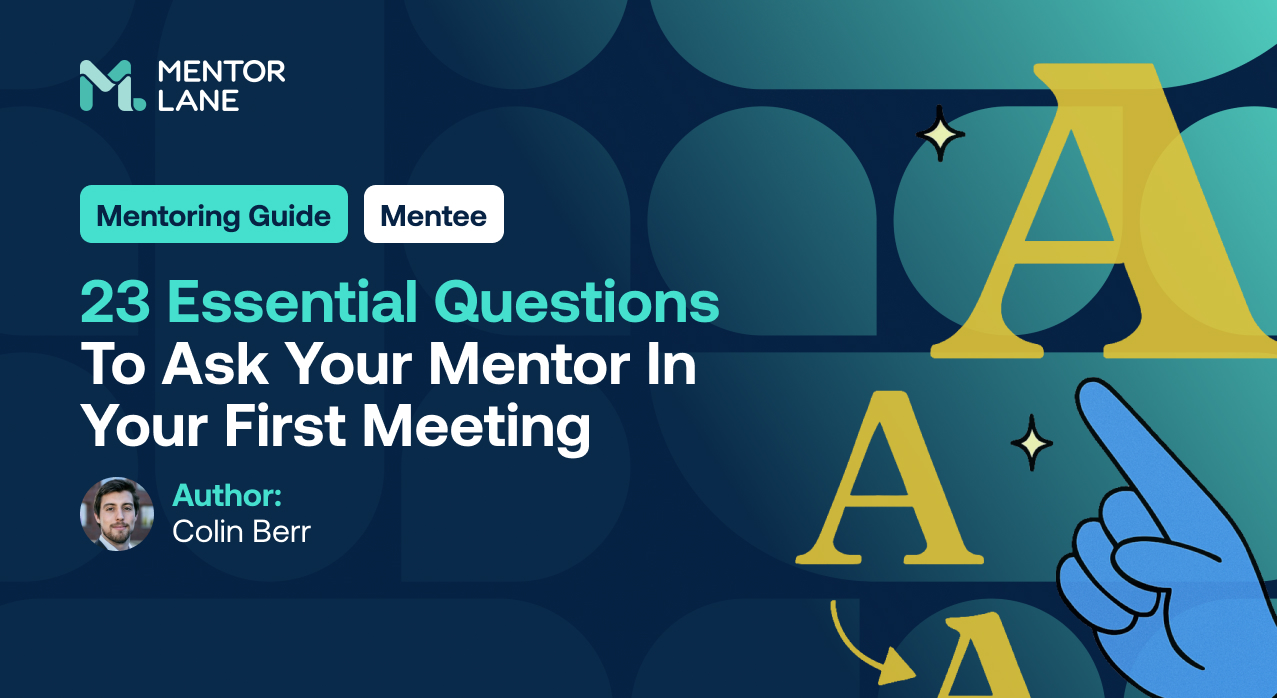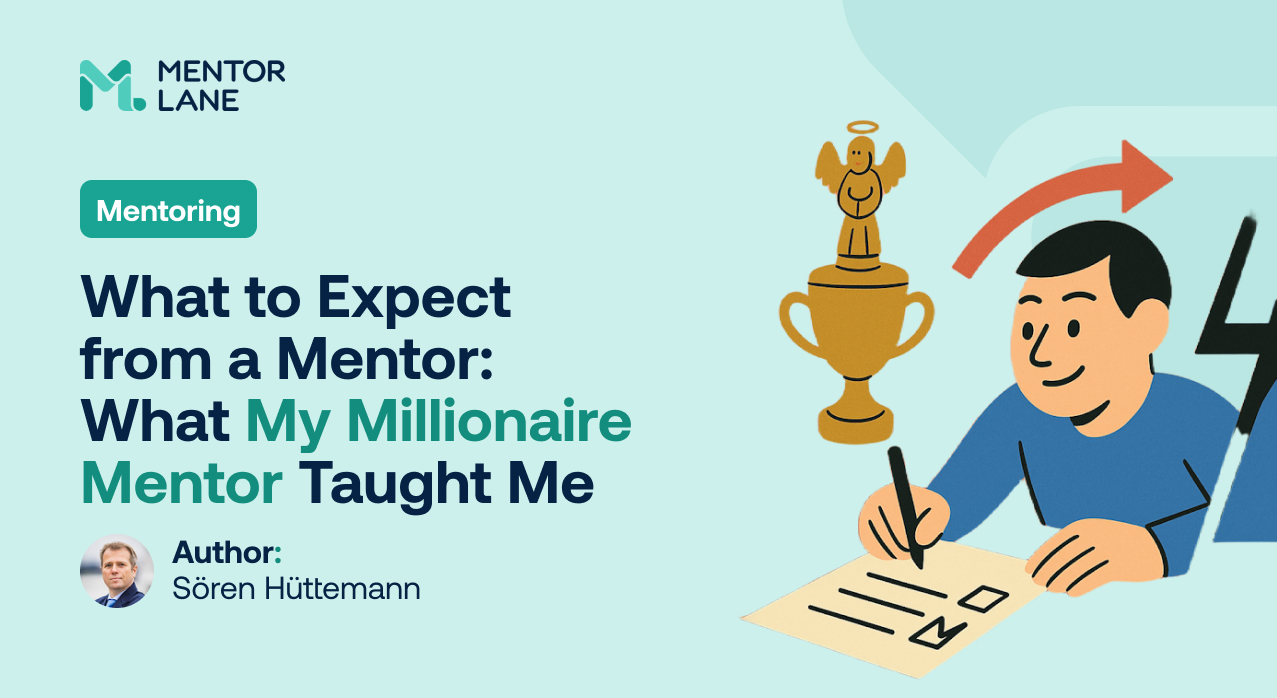News & Updates
25 Aug 12:57
12 min read
23 Essential Questions to Ask Your Mentor in Your First Meeting
Discover 23 essential questions to ask your mentor in your first meeting. Build trust, set expectations, and create a successful mentoring relationship that transforms your career.

Courtney Ellis
Media Manager

23 Questions to Ask Your Mentor in Your First Meeting
Download Here - Questions to Ask Your Mentor_Guide.pdf
You’re nervous. You’ve rehearsed what you’ll say three times in the mirror. You’re about to meet your mentor for the first time and suddenly you’re wondering:
What do I even ask them?
Here’s what most people get wrong about first mentoring meetings:
They treat them like job interviews instead of the beginning of a partnership. You’re not there to impress or be grilled, you’re there to start building something meaningful together.
The best mentoring relationships don’t happen by accident.
They’re built on a foundation of genuine curiosity, mutual understanding and yes, the right questions. But not the surface-level ones you’ve seen on every “mentoring tips” list online.
After analyzing successful mentoring partnerships and insights from the Bochum City Corporation’s cross-mentoring program, here are the questions to ask your mentor in your first meeting that actually matter and how to use them to create a mentoring relationship that transforms both of you.
Why Your First Meeting Sets Everything in Motion
Think of your first mentoring session like laying the cornerstone of a building. Get it right and everything else falls into place. Rush through it and you’ll spend months trying to course-correct a mentorship relationship that never quite clicks.
The goal isn’t to solve all your career problems in 60 minutes.
It’s to establish trust, understand each other’s communication styles and create a safe space for the real work to begin. As the African proverb goes:
> "If you want to travel fast, travel alone. If you want to travel far, travel together."
Your mentoring partnership is about going far together. Whether this is your first or subsequent encounters with mentorship, the foundation you build in that initial meeting determines everything that follows.
In any workplace mentoring program or mentorship program, the difference between transformative relationships and those that fizzle out often comes down to how well both the mentor and mentee establish clear expectations and mutual respect from the start.
Part 1: Build the Human Connection First
Before diving into career goals and development plans, start with the person sitting across from you.
Successful mentoring relationships are built on genuine human connection, not just professional transactions.
The most effective mentor-mentee relationships begin with understanding your mentoring partner as a complete person, not just their professional achievements.
Questions About Them
What's their story?
Listen for the challenges they overcame, the risks they took and what energised them along the way. This deeper understanding of their journey provides context for the mentor's advice they'll share throughout your mentoring connection.
"What do you love most about your current work?"
Notice we're not asking what they do, we're asking what they love. This reveals their values, what motivates them and gives you insight into the passion that drives their mentor's expertise. This question often reveals the core of why they chose to become a good mentor in the first place.
"What initially attracted you to your field, and how has that changed?"
Understanding their initial motivations and how they've changed helps you see potential paths for your career progression.
"What do you like to do outside of work?"
Personal rapport matters more than most people realise. Understanding your mentor as a whole person and not just their professional persona creates space for deeper connection and trust.
Your Turn - Share Your Story
Remember, effective mentoring is a two-way street. After asking about their journey, be prepared to share yours:
- What brought you to seek mentorship?
- What experiences have shaped your career path so far?
- What energises you outside of work?
- What significant challenges have you faced recently?
This reciprocal sharing establishes the mutual respect that healthy mentorship relationships require.
Part 2: Explore Mentoring Expectations and Experience
Mentees often assume their mentor knows exactly how to mentor them. The truth? Even experienced mentors benefit from understanding your specific needs and working style.
This is especially important in structured programs where a program administrator may have matched you based on skills and goals, but the interpersonal dynamics still need to be explored.
Their Mentoring Philosophy
"What do you want, need and expect from our mentoring relationship?"
Yes, you read that right—ask what they need. Effective mentoring works both ways. Maybe they're looking to develop their coaching skills, gain fresh perspectives or give back to the next generation. Understanding their motivations helps you contribute to a truly mutual partnership and ensures this becomes a successful relationship for both parties.
"Have you been in mentoring relationships before? What worked well and what would you do differently?"
This question reveals their mentoring style and helps you understand potential pitfalls before you encounter them. If they share that past mentees struggled with follow-through, you know consistency will be crucial. If they mention challenges with open communication, you'll know to prioritise transparency.
"What does success look like for you in this mentorship?"
Their definition of success might surprise you. Some mentors measure success by your career progression, others by your confidence growth, and still others by the quality of questions you learn to ask. This is crucial for establishing trust and aligned mentorship goals.
"How do you prefer to handle constructive criticism and feedback?"
Understanding their feedback style helps you receive their guidance more effectively and prepares you for how they might provide feedback throughout your relationship.
Setting the Stage for Your Partnership
"How do you prefer to communicate between our mentoring meetings?"
Establishing expectations about communication prevents misunderstandings later. Some mentors prefer scheduled check-ins, others welcome spontaneous questions via email or messaging platforms. This becomes especially important when you need to bounce ideas or ask a mentor urgent questions between formal sessions.
"What's the best way to prepare for our sessions together?"
This shows respect for your mentor's time and helps you maximise each mentoring session. Some mentors prefer you to come with specific scenarios to discuss, others want you to share recent wins and challenges, and still others appreciate when you research topics beforehand.
"Are there any professional boundaries we should establish upfront?"
This question demonstrates maturity and helps prevent awkward situations later. It also opens space to discuss personal experience sharing and what feels appropriate for your specific mentoring partnership.
Part 3: Unpack Needs, Goals and Learning Styles
Now we're getting to the heart of why you're both here. But instead of diving straight into your problems, start by exploring the bigger picture of your professional development.
Visioning Together
"What are your hopes and dreams for your career in the next 5 years?"
Notice this isn't asking for a detailed plan, it's asking for hopes and dreams. This opens up space for possibility and helps your mentor understand what truly motivates you, not just what you think you should want. This conversation often reveals career goals you hadn't fully articulated before.
"Which of my learning goals do you think align best with your experience and expertise?"
This question does several things: it shows you've thought strategically about the match, it invites them to share where they feel most confident helping you, and it begins to prioritise your mentoring goals. It also helps you understand where their mentor's expertise can best support your skill development.
"What skills or experiences do you think I'm missing for my next career transition?"
Your mentor's outside perspective is invaluable here. They can often spot blind spots or important skills gaps you haven't recognised. This is where their professional experience becomes immediately useful.
"Where do you see the biggest opportunities in my field?"
This question shifts focus from just your individual development to industry trends and emerging opportunities, giving context for your career development strategy.
Their Teaching Style
"How do you like to share knowledge through stories, frameworks, hands-on projects or something else?"
People learn and teach differently. Some mentors are natural storytellers who share wisdom through experiences. Others prefer structured frameworks or actionable exercises. Understanding their style helps you receive their career guidance better.
"What's your approach when I'm facing a big challenge do you prefer to guide me to my own answers or offer direct career advice?"
This prevents frustration later when you're hoping for specific direction but they're asking you more questions, or vice versa. It also helps you understand how they'll support you when you need to resolve conflicts or navigate tough situations.
"How do you like to track progress on goals we set together?"
Some mentors prefer formal check-ins, others like organic updates. Understanding their preference helps ensure your mentoring goals stay on track and you're both accountable to the outcomes you want to achieve success.
Practical Support
"What types of networking advice or introductions might be possible through your network?"
Be thoughtful here you're not asking for immediate introductions, but understanding what might be possible as the relationship develops. This also shows you value the broader support that comes from their professional experience.
"Are there specific professional development courses, conferences or resources you'd recommend for someone on my career path?"
This shows you're committed to continuous learning beyond just your mentoring sessions and helps you build a comprehensive development plan.
"What multiple projects or experiences helped accelerate your own growth?"
This question often reveals non-obvious development opportunities and helps you think creatively about your own growth trajectory.The strongest mentor-mentee relationships have a personal dimension. You don't need to become best friends, but understanding each other as whole humans creates deeper trust and connection.
Personality and Working Styles
"Have you taken any personality assessments like Gallup StrengthsFinder, MBTI or DiSC? How do you think our personalities might complement each other?"
If you've both taken assessments, this can be super helpful. Even if you haven't, discussing natural working styles, communication preferences and energy sources helps you collaborate more effectively. This is especially valuable for understanding how to work together on skill development and leadership qualities.
"What are your core values and how do they show up in your work?"
Values alignment isn't essential, but understanding differences prevents conflicts and helps you appreciate different perspectives. This also gives insight into their decision making process and the mentor's background that shapes their advice.
"What assumptions or limitations should we be aware of as we work together?"
This is a vulnerable question that invites honesty about potential challenges. Maybe they're traveling frequently, going through a busy season or have specific communication preferences that are important to honour for your mentoring relationship to work.
"How do you handle conflict resolution in professional settings?"
Understanding their approach to conflict helps you navigate challenges that might arise and also provides a model for handling difficult situations in your own career.
The Human Side
"What are you passionate about outside of work?"
"What's been your biggest learning or growth area recently?"
"If you could give your younger professional self one piece of advice, what would it be?"
These questions reveal the person behind the professional and often lead to the most meaningful conversations. They also show you see your mentor as someone who's still growing and learning which creates space for more authentic exchange.
"What's something you wish you'd known earlier in your career about [your industry/field]?"
This one is my favourite it often uncovers those insights that don't typically get shared in formal professional settings.
Questions for Subsequent Encounters (Building Momentum)
Once you've established the foundation, your follow-up questions in future mentoring sessions can dive deeper into specific areas of development and growth.
For Ongoing Development
"What patterns do you notice in how I approach challenges?"
"Where do you see my leadership qualities emerging?"
"What important skills should I focus on developing next?"
"How do you see my public speaking skills (or other specific abilities) improving?"
These questions help you get an outside perspective on your growth and areas to work on.
For Right Now
"I'd love to run this by you…"
"What would you do if you were me?"
"Can you help me think through the pros and cons of this?"
"How would you give feedback in this situation?"
These questions make your mentorship useful for current challenges.
For Long-Term
"How should I think about career development in this industry?"
"What trends am I missing?"
"Who else should I be learning from or connecting with?"
"What would a strong career progression look like in this field?"
These questions help you think about your long-term development.
The Questions That Build Trust
Some of the most powerful questions to ask first are not about careers at all – they're about getting to know each other:
"What's something you wish more people understood about your role/industry/experience?"
"What's been your most valuable learning experience, even if it was hard at the time?"
"What's your philosophy on taking risks in your career?"
"How do you balance giving advice versus letting someone figure it out themselves?"
These questions show you care about them as a person and professional, not just as a career advisor. They often lead to the most memorable conversations.
Space for Their Questions
Remember, mentoring is a conversation, not an interview. After you've asked your questions, give them space to ask theirs:
"What do you have for me?"
"What would help you understand me better?"
"Is there anything else you want to know about me or my goals?"
"What would make this mentorship most valuable for you?"
This reciprocal approach shows this is a partnership, not a one-way transaction.
Next Steps
Before wrapping up your first meeting, set the foundation for your ongoing relationship:
"What should I do before our next meeting?"
"How often should we meet and for how long?"
"How should we stay in touch between sessions?"
"How do we handle scheduling and any changes to our regular meetings?"
"What would you like me to track or document between our sessions?"
Get the logistics right and your mentoring meetings will run smoothly and respect both your time commitments.
The Most Important Question
Here's the question that really separates good mentors and mentees:
"How will we know when our mentoring relationship is successful?"
This isn't just about career goals it's about defining success for the relationship itself. Maybe it's when you feel confident making decisions independently, when you've expanded your network significantly or when you've developed specific skills.
Having this conversation upfront prevents the relationship from drifting without direction and ensures you're both working towards the same vision of success. It also provides a framework for measuring progress and knowing when you've achieved your mentorship goals.
There's More to Mentoring Than Asking Questions
The best mentorship experience happens when you move beyond scripted questions to genuine curiosity. Yes, prepare your questions for your first meeting but also:
- Listen more than you talk. Your mentor's insights often come through stories and tangents, not just direct answers. The mentor brings years of experience that emerges through natural conversation.
- Be vulnerable about your challenges. The mentors who provide constructive feedback and actionable advice need to understand your real struggles, not just your highlight reel.
- Show up consistently. Building rapport and establishing trust takes time and reliability. This is especially important in formal mentoring programs where consistency demonstrates commitment.
- Come prepared. Respect their time by thinking through what you want to discuss and any context they need. This shows you value their expertise and are serious about the partnership.
- Follow through on commitments. If you say you'll try something or research an idea, do it. This builds trust and shows you're actively engaged in your own development.
Your Mentoring Journey Starts Now
The questions you ask your mentor in your first meeting aren't just about gathering information; they're about building rapport, establishing mutual respect and creating the foundation for a mentorship relationship that can really change the course of your career.
Remember, your mentor chose to invest their time in you. They're not just sharing their professional experience, they're offering their wisdom, network and support. The questions you ask should honour that gift while also ensuring you get the most from this opportunity.
Go!

This post is also available in:
Related Posts
Sales Mentors: A 9-Round Guide to Sales Success with Michael Silberberger
Discover Michael’s 9-round guide to sales success. Learn how sales mentors help you build confidence, resilience, and lasting results.
What to Expect from a Mentor: What My Millionaire Mentor Taught Me
Curious what a millionaire mentor actually teaches? It's not about money tricks, it's mindset. Discover the surprising lessons that transformed Michael's approach to success and life.
How To Become a Mentor in Germany
Ever thought about becoming a mentor? Click here to work out if you're ready to become a mentor, and the steps to take to become a mentor in Germany.



-cd972d86.png)
